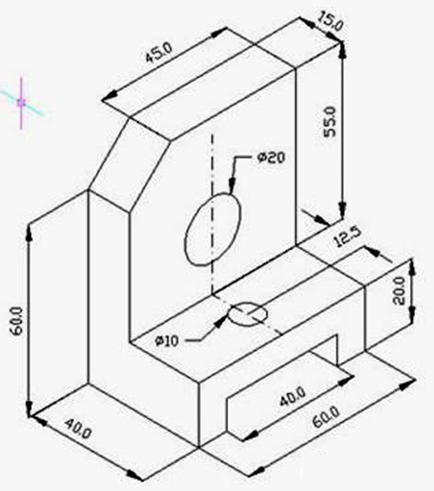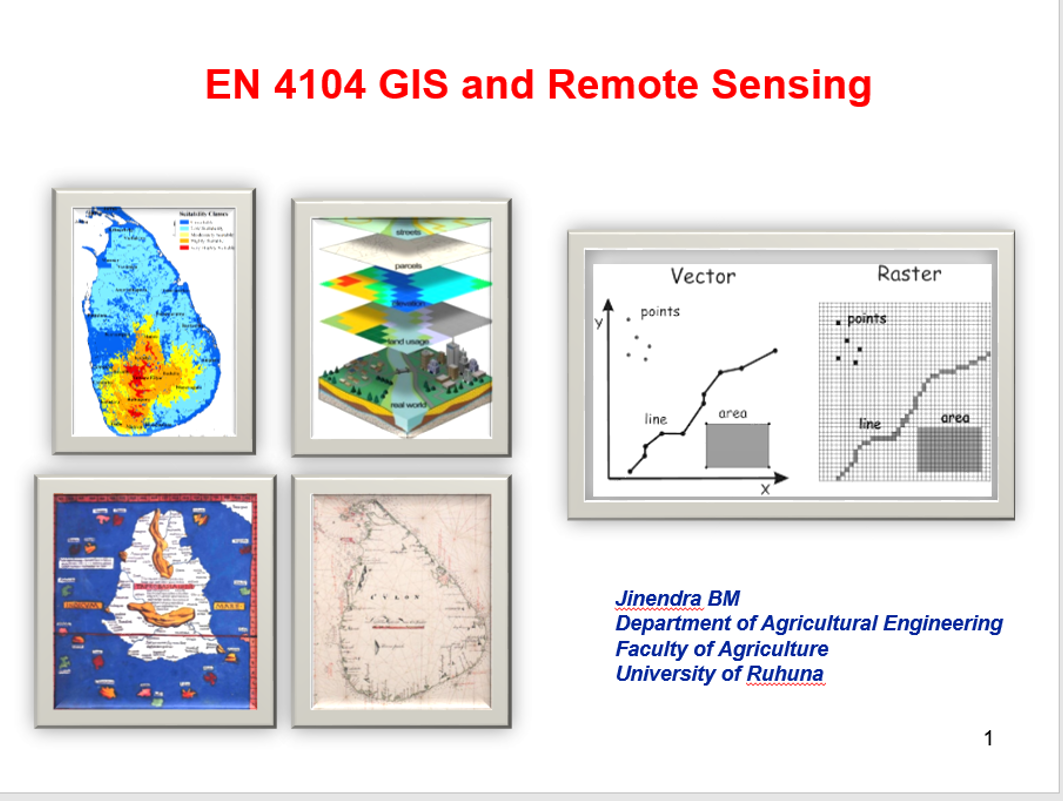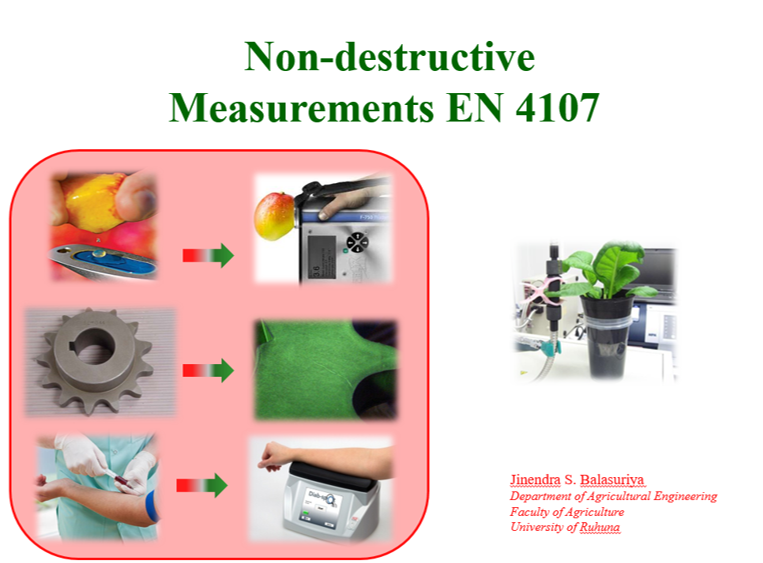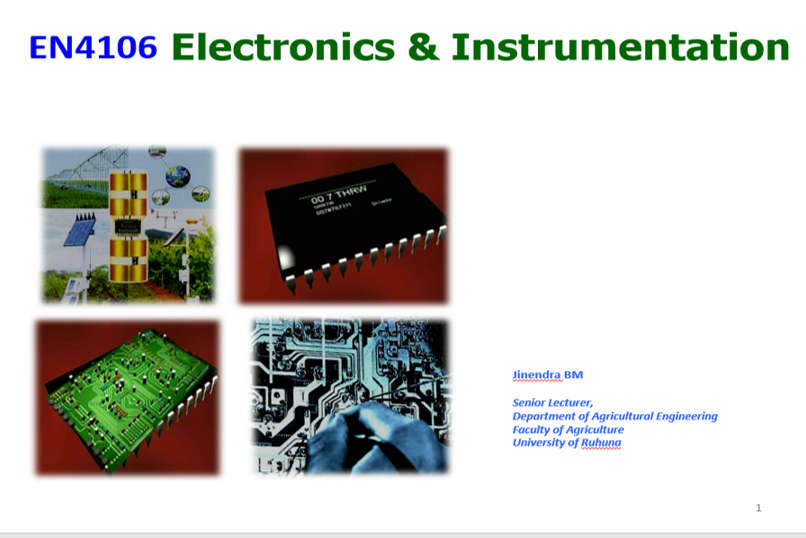Search results: 404
- Course Coordinator: Prof. GY Jayasinghe
- Course Coordinator: Prof. PLAG Alwis
- Lecturer: Mr. Pranith Ruwanpathirana
Computer Aided Drawing (CAD) (Auto CAD and Solid Works), Three dimensional modeling, Introduction to programming languages, Introduction to variable types, Introduce programming environment in Visual Basic, Defining, Declaring, Initializing variables in Visual Basic, Sub programmes in Visual Basic, Control constructors in Visual Basic, Debugging a programme, Error handling in Visual Basic.

- Course Coordinator: Mrs. CP Rupasinghe
- Lecturer: Dr. KKLB Adikaram
- Lecturer: Lasantha Adikaram
- Lecturer: Mr. Pranith Ruwanpathirana
GIS and remote sensing tools are useful components in almost any aspect of modern science, technology and management disciplines today. It helps for effective utilization of limited natural resources in various activities from average regional planning aspects up to global military purposes. It is also an essential tool for emerging smart agriculture based systems today. Therefore, the aim of this course is to provide the students with essential subject matter components in GIS and remote sensing in natural resource management. The core subject themes are included from data acquisition up to various mode of graphical presentations and field operation excitations. The course will also provide the students with hands on experience of data acquisition and handling, mapping, multivariate data handling, aerial photography, and Image analysis, interpretation including a case study: project based on selected theme of Sri Lankan map (disaster risk/ poverty etc.)
This is compulsory Two credit course module for the Degree Program Bachelor of Agricultural Resource Management and Technology for Semester 4-1

- Course Coordinator: Dr. Jinendra Siriwijaya Balasooriya
- Lecturer: Prof. S Wijetunga
- Course Coordinator: Mrs. CP Rupasinghe
- Course Coordinator: Dr. Jinendra Siriwijaya Balasooriya
Management of agricultural production and processing systems needs controlled levels of inputs to gain utmost benefits. This controlling is only possible if the parameters are measured correctly. However, most of the measuring and quantification methods are destructive. They are neither environmentally friendly no destruction free. In contrary there are possible non-destructive testing methods. Near-infrared spectroscopy (NIRS) is a multivariate data investigation technique that uses the near-infrared region (800 - 2,500nm) of the electromagnetic spectrum. NIRS, is an instrument based technology that does not depend on destructive chemical analytical procedures, is now being used successfully in many agricultural and manufacturing industries worldwide due to its flexibility and reliability in determine quality parameters for biological materials.
As such, this course module will provide the undergraduates a sound knowledge on basics about non-destructive testing and a deep theoretical and practical knowledge about NIR spectroscopy as a non-destructive techniques to be used in agricultural based systems.
This is compulsory Two credit course module for the Degree Program Bachelor of Science in Green Technology for Semester 4-1

- Course Coordinator: Dr. Jinendra Siriwijaya Balasooriya
- Lecturer: Mr. Pranith Ruwanpathirana
Modern Electronics era started late 1940 and is just past 80 years'
flag. It is still the key driving force for the modern science and technology.
It is a magnificent platform for all modern sophisticated innovations and in
various applied sciences. So does in the field of agriculture as well. With the
emerging trend of smart farming technology concepts, there are various systems
for sensor embedded electronics to play a vital role in agriculture. Electronic
based systems accumulate large amount of data on soil, crop and weather status while
controlling and managing fertigation, weeding, watering, pruning, harvesting
and various other practices. They are
vital in controlling systems employed in indoor plant houses for controlling
Temperature, RH, light pH and EC in artificial intensive cultivation systems. This Optional course is for final year students who are seeking essential knowledge to
work in hardware components of all above mentioned electronic applications in the
field of Agriculture.
This is Two Credit Elective course module for the Degree Program Bachelor of Agricultural Resource Management and Technology for Semester 4-1

- Course Coordinator: Dr. Jinendra Siriwijaya Balasooriya
Aim of the course
To provide knowledge on evaluating and implementing various Modelling methodologies for specific systems, with a particular emphasis on environmental and ecosystem management. Following introductory lectures covering fundamental modelling principles, the course will primarily emphasize practical application, often commencing with a brief overview lecture before delving into modelling exercises.
At the end of this course, students should be able to:
- Describe the basic functions of modeling in agriculture.
- Identification of suitable scale changes and model linking methods.
- Explain the effect of climate, soil and management interactions on modeling.
- Carry out parameter sensitivity and uncertainty analysis of model.
- Carry out model calibration and validation for new regions and situations.
- Simulate model under given conditions.
- Course Coordinator: Prof. GY Jayasinghe
- Lecturer: Mr. WBMAC Bandara
- Course Coordinator: Prof. GY Jayasinghe
- Lecturer: Mr. Pranith Ruwanpathirana
- Course Coordinator: Dr. Jinendra Siriwijaya Balasooriya
- Lecturer: Mr. WBMAC Bandara
- Course Coordinator: Mr. Pranith Ruwanpathirana
- Lecturer: Mr. KMTS Bandara
- Lecturer: Mr. WBMAC Bandara
- Lecturer: Anupa Koswatta
- Lecturer: Mrs. CP Rupasinghe
This course will guide you plan a research project, write your research paper/ thesis, and publish your research paper.
- Course Coordinator: Dr. WMCJ Wijekoon
- Lecturer: Prof. GY Jayasinghe
- Course Coordinator: Dr. Jinendra Siriwijaya Balasooriya
- Course Coordinator: Prof. GY Jayasinghe
- Lecturer: Mrs. MGG Awanthi
- Lecturer: Dr. Jinendra Siriwijaya Balasooriya
- Lecturer: Mr. KMTS Bandara
- Lecturer: Mr. WBMAC Bandara
- Lecturer: Anupa Koswatta
- Lecturer: Mrs. CP Rupasinghe
- Lecturer: Prof. Saman Seneweera
- Lecturer: Prof. S Wijetunga
- Course Coordinator: Mrs. MGG Awanthi
- Lecturer: Mrs. CP Rupasinghe
- Course Coordinator: Prof. GY Jayasinghe